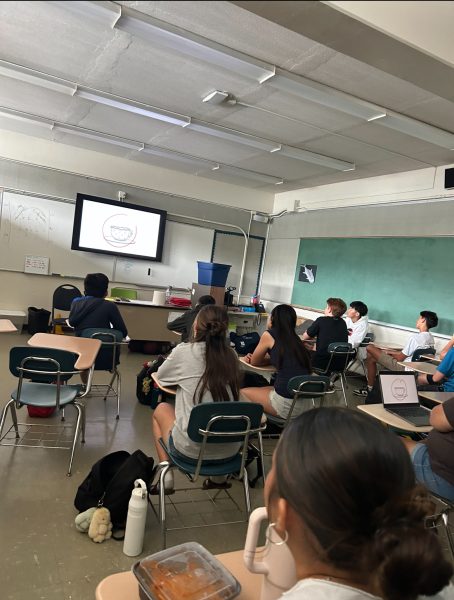Do grades actually matter?
With heads in hands, students study in the library, preparing for final assessments.
By Joaquin Mejia
Staff Writer
No matter what class you take, you are bound to hear students questioning the education system with “when are we going to use this,” or “where can we see this in the real world?”
Despite such skepticism about what students are learning, they achieve higher GPAs and test scores each year, according to the Department of Education. As society’s emphasis on grades continues to grow, many students worry about their grades determining their future. But can someone’s test scores affect their lives after school?
The short answer is yes high school grades matter. But grades fail to show valuable traits that students have.
“It could fail to represent a person’s, people skills or things that might matter more to a job than to a college. It can’t account for personality,” said junior Miko Oide.
Grades cannot even measure intelligence at times, as Steve Jobs had a 2.65 high school GPA. Although he is an outlier, his story shows how school grades cannot accurately measure intelligence or success.
But this is not the main problem with the traditional grading system. The emphasis on grades takes the focus away from learning and shifts it towards test scores.
“Now the question is, do grades help students learn because that’s never the ultimate goal? Was school a place where students come to learn? Or is it a place to say what they’ve learned? And those two things, it turns out, aren’t very well connected,” said Kupuhou Director Dr. Mark Hines.
Even though students strive to get A’s instead of trying to learn, learning should be the main objective of the school. The skills students should learn are less about the content of the material and more about the skills and attributes that one can learn for life.
“[Grades] measure their effort, because a lot of a grade can be just turning in assignments and making them good quality. But at the same time, most of your cumulative grades will be from tests. So it could also measure their test-taking skills, their studying skills,” said junior Anya Chen.
Studying skills, discipline and other characteristics one can develop in high school can help students in almost every facet of life.
“Do you show up with a good attitude, and a strong work ethic? And are you enthusiastic about what you’re doing? Are you positive about what you’re doing? Do you complete your work? In the work world, those things are important.” said college counselor Sara Mckay Hines.
Being academically successful can only be an advantage to one’s career. Aside from receiving a prestigious diploma, Ivy League graduates earn more money. According to a Washington Post article, “The top 10 percent of Ivy League grads are earning $200,000 or more ten years after starting school.”
This may be why there is a strong correlation between high school GPA and income. A 2014 study done by the University of Miami, found that the higher your GPA is, the higher your salary will be.
While grades do not define students, they should focus on learning, and hopefully high grades will follow.
Of course, this is easier said than done when cumulative GPA is the largest factor in college admissions.
“The world we live in today, you have to focus on grades, honestly. And that’s not a fault of the student, it’s more a fault of our society,” said Oide.









